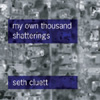Seth Cluett, "My Own Thousand Shatterings"
 The title comes from poet and mescaline-prophet Henri Michaux; it is his vision of standing in a rainstorm, its persistent torrents, rather than enacting cleansing or comfort, are instead divisive, penetrating the body towards a thunderous disintegration. "I was, and was not, I was caught yet I was lost, I was in a state of complete ubiquity. The thousands upon thousands of rustlings were my own thousand shatterings." Three recordings make up sound artist Seth Cluett's own homage to rain, one a field recording taken during a storm, the preceding two consecutive reworkings of the resulting master tape. Cluett presents the three parts in "reverse" order: the first was created last as a reinterpretation or a remembering of the second, which was performed as a live manipulation of the original tape, a performance guided by the artist's recollections of the experience of recording the source material, presented unchanged in the third section.Sedimental
The title comes from poet and mescaline-prophet Henri Michaux; it is his vision of standing in a rainstorm, its persistent torrents, rather than enacting cleansing or comfort, are instead divisive, penetrating the body towards a thunderous disintegration. "I was, and was not, I was caught yet I was lost, I was in a state of complete ubiquity. The thousands upon thousands of rustlings were my own thousand shatterings." Three recordings make up sound artist Seth Cluett's own homage to rain, one a field recording taken during a storm, the preceding two consecutive reworkings of the resulting master tape. Cluett presents the three parts in "reverse" order: the first was created last as a reinterpretation or a remembering of the second, which was performed as a live manipulation of the original tape, a performance guided by the artist's recollections of the experience of recording the source material, presented unchanged in the third section.Sedimental
I think some of the reasoning behind this sequence traces back to Cluett's continuing interest in the factor of the human presence, however passive, within an auditory environment. In its initial representation, the rainstorm comes twice removed from its physical or natural circumstance, so that by the end of the three sections an ultra-gradual transformation has occurred as the sound moves slowly back toward a presumably "pure", or actual manifestation. The artist's emphasis is on the way his own perception (as a physical presence acting within a space), or even the memory of his perceiving, come to effect his reactions to, or processing of, particular phenomena. Cluett uses Michaux's words to bring out the powerful and disarming qualities of rainfall, its infinite variety and its Zen-like totality, how it maps every surface with a thousand all-reaching arms, while in the same instant performing a complete white-out of the landscape, a wall of coagulated sound and blurry, impressionist vision. The glancing blows and shatterings that Michaux felt in the rain Cluett has obviously shared, and his "response" pieces try to simulate the water's dual personality. The artist establishes the rain's blanketing, everywhere-at-once quality in his use of the drone, a blank constancy slow to rise and fall but one which opens onto an inner world of speeding detail. The manipulated rainfall becomes a rich, organ-esque heaviness given the illusion of speed by the layering of purer sounding tones in slowly climactic modulation. Cluett describes being inspired by the excited movement of a glacier in Pakistan: "a very fast slow". The saturating effect of the disc's first two tracks is remarkable given the artist's limited resources and deliberate monotony; when played loud the outwardly placid drones ease into streaming patterns, relentless and pummeling, though also comforting in the way they hold the body and the room in edgeless reverberation. While the first section is the more dramatic, its tones breaking several times into peaks of throbbing feedback, the second segment is longer, slower and eventually more successful in recreating the rain's effect as an immersive soundworld of both dizzying speed and suspended landscape. This makes sense given the track sequence, as the second piece should theoretically be closer to the original experience of the rainstorm. When in the third section the rain and thunder arrive as originally captured, the recording interestingly fails to do justice to the captivating power explained by the first two. The familiarity of the sounds comes almost as a comfort after such intense precedents; however I will say that after sitting through all 15 min. of this rain, by the end I did feel a lot nearer to an open window, and wincing at the thunder for sure.
samples:



